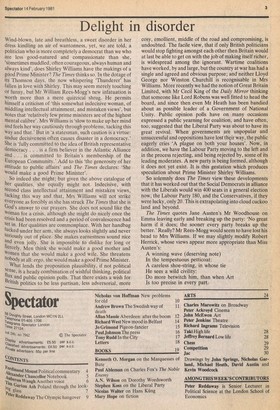Delight in disorder
Wind-blown, late and breathless, a sweet disorder in her dress kindling an air of wantonness, yet, we are told, a politician who is more completely a democrat than we who are less good-natured and compassionate than she, 'sometimes muddled, often courageous, always human and always kind', does Shirley Williams have the makings of a good Prime Minister? The Times thinks so. In the dotage of its Thomson days, the now whispering `Thunderee has fallen in love with Shirley. This may seem merely touching or funny, but Mr William Rees-Mogg's new infatuation is Worth more than a mere quizzical shrug. He permits himself a criticism of 'this somewhat indecisive woman, of middling intellectual attainment, and mistaken views', but notes that 'relatively few prime ministers are of the highest mental calibre'. Mrs Williams is 'slow to make up her mind and feels her way cautiously through problems, tacking this Way and that.' But in 'a statesman, such caution is a virtue: undue decisiveness often causes disaster in a democracy.' She is 'fully committed to the idea of British representative democracy . . . is a firm believer in the Atlantic Alliance and . is committed to Britain's membership of the European Community.' Add to this 'the generosity of her attitude to public affairs' and The Times declares: 'She Would make a good Prime Minister'.
So indeed she might; but given the above catalogue of her qualities, she equally might not. Indecisive, with second class intellectual attainment and mistaken views, tacking this way and that, Mrs Williams will not strike everyone as forcibly as she has struck The Times that she is God's answer to our prayers. She does not sound like the Woman for a crisis, although she might do nicely once the Crisis had been resolved and a period of convalescence had set in. Her qualities are commonplace. With her handbag tucked under her arm, she always looks slightly and never seriously out of place. She makes earnestness sound nice and even jolly. She is impossible to dislike for long or fiercely. Men think she would make a good mother and women that she would make a good wife. She threatens nobody at all: ergo, she would make a good Prime Minister. What lends the proposition plausibility, if not political SenSe, is a heady combination of wishful thinking, political flux and public Opinion polls. That there exists a wish for Band politics to be less partisan, less adversorial, more cosy, emollient, middle of the road and compromising, is undoubted. The facile view, that if only British politicians would stop fighting amongst each other then Britain would at last be able to get on with the job of making itself richer, is widespread among the ignorant. Wartime coalitions have worked, by and large, but the country at war has had a single and agreed and obvious purpose; and neither Lloyd George nor Winston Churchill is recognisable in Mrs Williams. More recently we had the notion of Great Britain Limited, with Mr Cecil King of the Daily Mirror thinking that someone like Lord Robens was well fitted to head the board, and since then even Mr Heath has been bandied about as possible leader of a Government of National Unity. Public opinion polls have on many occasions expressed a public yearning for coalition, and have often, too, suggested that the Liberal Party was about to have its great revival. When governments are unpopular and unsuccessful and oppositions have lost their way, the public eagerly cries 'A plague on both your houses'. Now, in addition, we have the Labour Party moving to the left and in the process rejecting, and being rejected by, some of its leading moderates. A new party is being formed, although it does not yet exist. It is this gestation which produces speculation about Prime Minister Shirley Williams.
So solemnly does The Times view these developments that it has worked out that the Social Democrats in alliance with the Liberals would win 400 seats in a general election now, the Labour Party 180, and the Conservatives, if they were lucky, only 20. This is extrapolating into cloud cuckoo land and beyond.
The Times quotes Jane Austen's Mr Woodhouse on Emma leaving early and breaking up the party: 'No great harm if it does; the sooner every party breaks up the better.' Really? Mr Rees-Mogg would seem to have lost his head to Mrs Williams. If we may slightly modify Robert Herrick, whose views appear more appropriate than Miss Austen 's: A winning wave (deserving note) In the tempestuous petticoat: A careless shoe-string, in whose tie He sees a wild civility: Do more betwitch him, than when Art Is too precise in every part.






































 Previous page
Previous page